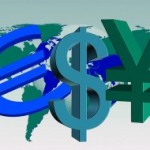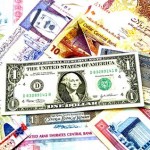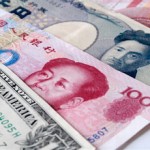Dollar Rises to 7-Year High Versus Yen as Aussie Slides on GDP

The dollar strengthened to a seven-year high against the yen before U.S. data this week that economists say will back the case for higher interest rates as Japan and Europe ease policy.
The greenback was 0.2 percent from its strongest in two years against the euro before the European Central Bank meets tomorrow. Australia’s currency slid to a four-year low after a report showed economic growth was less than forecast. New Zealand’s dollar weakened following a drop in milk prices at an auction. Federal Reserve Vice Chairman Stanley Fischer said yesterday low oil prices are a boon to the U.S. economy.
“The market has been paying attention to comments by Fed officials that lower energy prices are a plus for the U.S. recovery,” said Yasuhiro Kaizaki, vice president for global markets at Sumitomo Mitsui Trust Bank in New York. “That optimism over the economic outlook is fueling dollar buying.”
The dollar was little changed at 119.24 yen at 1:27 p.m. in Tokyo, after reaching 119.44, the highest since August 2007. It was at $1.2385 per euro from $1.2383 in New York. The greenback touched $1.2358 on Nov. 7, the strongest since August 2012. The euro traded at 147.69 yen from 147.63.
The Bloomberg Dollar Spot Index, which tracks the U.S. currency against 10 trading partners, was little changed at 1,111.18 from yesterday, when it closed at the highest level since March 2009. The gauge has risen 9 percent in 2014, heading for its best year since Bloomberg started compiling the data in 2004.
U.S. Recovery
The dollar has been buoyed by a strengthening labor-market recovery. U.S. employers added at least 200,000 jobs for a 10th month in November, according to economists surveyed by Bloomberg News before the data are released on Dec. 5.
Falling oil prices may spur U.S. consumption, Fischer told a CEO Council conference in Washington. He said officials are closer than they were “a few months ago” to dropping a pledge to keep interest rates low for a “considerable time.”
The Fed stopped buying bonds under its quantitative-easing strategy in October, even as the Bank of Japan expanded its monetary base and the ECB considered starting its own sovereign bond-buying program.
“There’s a view emerging in the market that it wouldn’t be odd if the ECB announced this week that it was going to start buying government bonds,” Sumitomo Mitsui’s Kaizaki said.
Best Performer
The U.S. currency has gained 9.6 percent in the past year, the best performer among 10 developed-nation currencies tracked by Bloomberg Correlation-Weighted Indexes. The euro fell 1.1 percent and the yen dropped 7.4 percent, the biggest decline.
Australia’s dollar weakened against all but one of its major peers after the Bureau of Statistics said gross domestic product advanced 0.3 percent in the third quarter from the previous three months. The result was less than the weakest estimate of 29 economists, who had a median of 0.7 percent.
The Aussie dropped 0.5 percent to 84.07 U.S. cents, after reaching 83.92 cents, the least since July 2010. New Zealand’s kiwi dollar weakened 0.4 percent to 77.72 U.S. cents, extending a 0.8 percent decline from yesterday.
New Zealand’s currency retreated for a second day after the average price for whole milk powder at a Fonterra Cooperative Group Ltd. auction fell to $2,229 per metric ton, less than half the early February price of $5,005.
Source: Bloomberg – Dollar Rises to 7-Year High Versus Yen as Aussie Slides on GDP



























